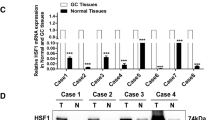Abstract
Purpose
Tumor-associated macrophages (TAMs), are crucial for the survival and development of tumor cells. Heat shock factor 1 (HSF1) is a potent, complex carcinogenesis modulator, and esophageal cancer (EC) patients have a bad prognosis when HSF1 is highly expressed. HSF1's clinical importance and biological role in TAMs are still unknown.
Methods
The HSF1 expression profile and patient survival information were analyzed from the TCGA database. The infiltration of different types of immune cells in EC was evaluated based on HSF1 gene expression by Sangerbox 3.0. Immunochemistry was employed to assess HSF1 protein expression in 134 individuals with esophageal squamous cell carcinoma (ESCC), proceeded by association with clinicopathological variables. The role of macrophage-driven HSF1 were observed using HSF1-knockdown THP1 cells.
Results
High level of HSF1 have a poorer prognosis in individuals with EC. The expressing level of HSF1 was positively related to infiltration of M2 macrophages (P < 0.05). The expression of HSF1 in macrophages was an independent factor for DFS (P = 0.002) and OS (P = 0.002) in ESCC cases. HSF1 was up-regulated in IL-4 stimulation THP1 cells in a time-dependent manner. Under the heat stimulation condition, THP1-derived macrophages were more sensitive than tumor cells. Compared to IL-4 induced-THP1 cells control, the HSF1 knockdown in THP1 cell inhibited the growth and proliferation of ESCC cells.
Conclusions
The up-regulation of HSF1 was more rapid and could affect the proliferation of tumor cells in IL4-induced macrophages. The expression of HSF1 in TAMs can also serve as a marker for ESCC prognosis.




Similar content being viewed by others
Data availability
Not applicable.
References
Cao W, Chen HD, Yu YW, Li N, Chen WQ. Changing profiles of cancer burden worldwide and in China: a secondary analysis of the global cancer statistics 2020. Chin Med J (Engl). 2021;134(7):783–91.
Li J, Xu JG, Zheng YD, Cao Y, He SY, Li H, et al. Esophageal cancer: epidemiology, risk factors and screening. Chin J Cancer Res. 2021;33(5):535–47.
He WW, Mao TQ, Yan JX, Leng XF, Deng XY, Xie Q, et al. Moderately differentiated esophageal squamous cell carcinoma has a poor prognosis after neoadjuvant chemoradiotherapy. Ann Transl Med. 2021;9(8):706.
Pan YY, Yu YD, Wang XJ, Zhang T. Tumor-associated macrophages in tumor immunity. Front Immunol. 2020;11: 583084.
Wang N, Wang SQ, Wang X, Zheng YF, Yang BW, Zhang JP, et al. Research trends in pharmacological modulation of tumor-associated macrophages. Clin Transl Med. 2021;11(1): e288.
Goswami KK, Bose A, Baral R. Macrophages in tumor: an inflammatory perspective. Clin Immunol. 2021;232: 108875.
Sorger PK, Pelham HR. Yeast heat shock factor is an essential DNA-binding protein that exhibits temperature-dependent phosphorylation. Cell. 1988;54:855–64.
Vihervaara A, Sistonen L. HSF1 at a glance. J Cell Sci. 2014;127:261–6.
Jiang SF, Tu KL, Fu Q, Schmitt DC, Zhou L, Lu N, et al. Multifaceted roles of HSF1 in cancer. Tumor Biol. 2015;36:4923–31.
Zhang JB, Guo K, Sun HC, Zhu XD, Zhang B, Lin ZH, et al. Prognostic value of peritumoral heat-shock factor-1 in patients receiving resection of hepatocellular carcinoma. Br J Cancer. 2013;109:1648–56.
Villanueva MT. Microenvironment: HSF1, the troublemaker next door. Nat Rev Cancer. 2014;14:579.
Liao YH, Xue Y, Zhang L, Feng XW, Liu WL, Zhang G. Higher heat shock factor 1 expression in tumor stroma predicts poor prognosis in esophageal squamous cell carcinoma patients. J Transl Med. 2015;13:338.
Zhang B, Wang YP, Zhao ZY, Han B, Yang JB, Sun Y, et al. Temperature plays an essential regulatory role in the tumor immune microenvironment. J Biomed Nanotechnol. 2021;17(2):169–95.
Catozzi C, Ávila G, Zamarian V, Pravettoni D, Sala G, Ceciliani F, et al. In-vitro effect of heat stress on bovine monocytes lifespan and polarization. Immunobiology. 2020;225(2): 151888.
Mao Y, Poschke I, Kiessling R. Tumour-induced immune suppression: role of inflammatory mediators released by myelomonocytic cells. J Internal Med. 2014;276(2):154–70.
Du PZ, Chang YW, Dai FJ, Wei CY, Zhang Q, Li JM. Role of heat shock transcription factor 1(HSF1)-upregulated macrophage in ameliorating pressure overload-induced heart failure in mice. Gene. 2018;667:10–7.
Lan CY, Huang X, Lin SX, Huang HQ, Cai QC, Wan T, et al. Expression of M2-polarized macrophages is associated with poor prognosis for advanced epithelial ovarian cancer. Technol Cancer Res Treat. 2013;12(3):259–67.
Zhao XX, Qu JK, Sun YC, Wang JZ, Liu X, Wang FD, et al. Prognostic significance of tumor-associated macrophages in breast cancer: a meta-analysis of the literature. Oncotarget. 2017;8(18):30576–86.
Yin SC, Huang JY, Li Z, Zhang JY, Luo JZ, Lu CY, et al. The prognostic and clinicopathological significance of tumor-associated macrophages in patients with gastric cancer: a meta-analysis. PLoS ONE. 2017;12(1): e0170042.
Funding
This work was supported by the National Natural Science Foundation of Guangdong Province (No. 2019A1515010500).
Author information
Authors and Affiliations
Contributions
Study concept and design: GZ, YL; acquisition of data: YL, QL, YH, JL; analysis and interpretation of data: YH, JM; drafting of the manuscript: YL, GZ; critical revision of the manuscript for important intellectual content: GZ; statistical analysis: YL, GZ.
Corresponding author
Ethics declarations
Conflict of interest
The authors declare that they have no competing interests.
Ethical approval
The Institutional Review Board of Sun Yat-Sen University Cancer Center approved this study.
Informed consent
Subjects signed the informed consent.
Patient consent
Obtained.
Additional information
Publisher's Note
Springer Nature remains neutral with regard to jurisdictional claims in published maps and institutional affiliations.
Supplementary Information
Below is the link to the electronic supplementary material.
Rights and permissions
Springer Nature or its licensor (e.g. a society or other partner) holds exclusive rights to this article under a publishing agreement with the author(s) or other rightsholder(s); author self-archiving of the accepted manuscript version of this article is solely governed by the terms of such publishing agreement and applicable law.
About this article
Cite this article
Li, Y., Li, Q., Liu, J. et al. HSF1 expression in tumor-associated macrophages promotes tumor cell proliferation and indicates poor prognosis in esophageal squamous cell carcinoma. Clin Transl Oncol 25, 1682–1689 (2023). https://doi.org/10.1007/s12094-022-03063-8
Received:
Accepted:
Published:
Issue Date:
DOI: https://doi.org/10.1007/s12094-022-03063-8




